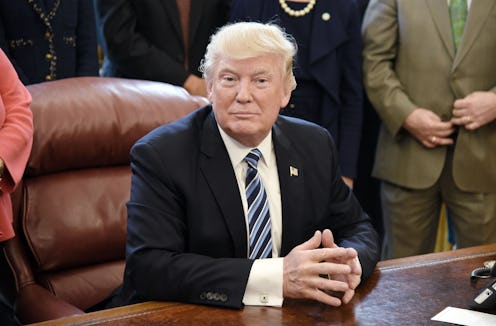News
Here's What's Changed In Trump's First 100 Days

President Trump has officially completed his first 100 days in office. Although he's faced numerous severe setbacks during his young presidency, don't let that fool you: A whole lot has changed during Trump's first 100 days as president. The administration has made a number of serious and far-reaching policy decisions, and they've had a significant impact — on how America is being run, and how Americans are being governed.
To be sure, a good number of Trump's initiatives have failed, often spectacularly. His high-profile attempt to repeal and replace Obamacare fell flat in the House of Representatives, with Speaker Paul Ryan pulling the bill from the floor due to lack of support among Republicans. Trump's executive orders on immigration, which prevented citizens from several Muslim-majority countries from entering the United States, have been halted repeatedly by federal judges, as has his attempt to deny federal funding to sanctuary cities. The president has signed no major legislation so far, and his proposal to build a U.S.-Mexican border wall hasn't made any progress.
On the surface, that's a lot of failure. But plenty of Trump's executive orders haven't been struck down, and moreover, there are a number of other ways a president can change federal policy that have nothing to do with either Congress or executive orders. Here are some of the most significant things that have changed since Trump took office on Jan. 20, 2017.
LGBT, Women, And Health
- Transgender students fighting to use the bathrooms of their choice are no longer being defended in court by the federal government.
- States may now deny funding to Planned Parenthood.
- The federal government is no longer allowed to give money to foreign charities if they provide information on abortion.
- The federal government stopped collecting demographic data on certain LGBT Americans.
- Federal contractors no longer have to demonstrate that they aren't discriminating against LGBT workers.
The Environment
- Federal agencies are no longer required to help states and localities prepare for the impacts of climate change.
- The Bureau of Land Management has less authority to make decisions regarding the use of public lands.
- The Dakota Access and Keystone XL pipelines now have the support of the federal government and will be fully constructed.
- Mining companies no longer have to monitor the water quality in nearby waterways.
- The federal government is now allowed to issue new leases for coal production on federal grounds; President Obama had suspended these leases.
- The Environmental Protection Agency is in the early stages of ending Obama's Clean Power Plan.
- Energy companies no longer have to disclose payments they've received from private corporations.
Immigration
- Immigration and Customs Enforcement (ICE) is in the process of tripling its staff.
- Due to the reversal of two Obama-era rules, the federal government is allowed to immediately deport undocumented immigrants who came to the country as children and haven't been convicted of any crimes.
- ICE officials no longer prioritize serious criminals for deportation.
- There's now a federal hotline where Americans can report crimes committed by undocumented immigrants.
Administrative And Miscellaneous
- Americans with a history of mental illness are now allowed to buy firearms.
- The government now must eliminate two existing regulations for every new regulation it implements.
- U.S. agencies are investigating ways to roll back the Dodd-Frank financial reform bill.
- Neil Gorsuch is a Supreme Court Justice.
- Senators may no longer filibuster Supreme Court nominees.
- Federal policy surrounding Historically Black Colleges and Universities is now concentrated in the White House, as opposed to the Department of Education.
- The Justice Department is forming a task force to crack down on foreign-based crime, such as drug trafficking and illegal immigration.
Those are some big changes, full stop. That said, it's also worth noting the changes that Trump was expected to make, but hasn't — specifically, with regard to America's foreign policy.
Trump hasn't pulled the United States out of NAFTA, or withdrawn American troops from South Korea. Despite saying during the campaign that the U.S. shouldn't be fighting Syrian President Bashar al-Assad, Trump launched cruise missiles at a regime-held airport in the country. He hasn't dismantled the nuclear deal with Iran, nor has he reversed America's position on the "One China" policy. On foreign policy, Trump has been a surprisingly conventional president.
Nevertheless, America itself is headed in a much different direction under Trump than it was under Obama. He's already successfully shaped several major aspects of American policy during his short time in office, and there will undoubtedly be many more changes to come.